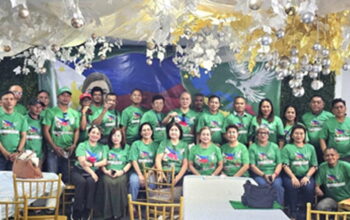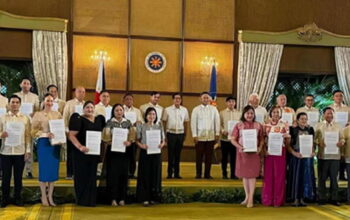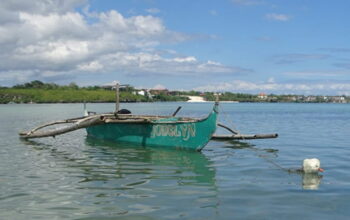THE United Nations Educational, Scientific, and Cultural Organization (UNESCO) officially designates Bohol Island as a Global Geopark after deliberations during the 216th UNESCO Executive Board Session held in Paris, France, on May 24, 2023.
The island province now becomes the first and the only one in the Philippines to get the UNESCO designation. One of the volunteer geologists of the Bohol Global Geopark, Lea Bron, said this bid for the designation took ten years to achieve; from seminars to identifying geosites, complying with the requirements, and information education campaigns for Boholanos on what the Geopark is all about.
“This is a collaborative effort done by us and the people of Bohol that took ten years to culminate, fueled by love for the province,” Bron said.
She added the Geopark concept is a strategy that covers different sectors of Eco-Cultural tourism, Agro-industry, Heritage preservation, and Environmental management. With Bohol officially a Geopark, scientists hope this could be a start for the province to increase its environmental conservation efforts, especially on geological diversity awareness.
“Geological diversity is so important to us as it is the very foundation upon which biodiversity is built. It is the bedrock in which humans of different cultures interact with their surrounding ecosystems,” Bron said.
The Bohol Provincial Environment Management Office (BPEMO) Head Jovencia Ganub said that the designation is a significant milestone that Boholanos should celebrate.
“It is an honor that UNESCO designated us as a Global Geopark because it means that they saw something special about our island’s geological landscape,” Ganub said.
Ganub, during her sit-down interview with the Provincial Information and Media Office, said the UNESCO inscription could pave for more scientific research on Bohol’s geological landscape, which she said the Provincial Government of Bohol (PGBH) actively supports.
“We can expect more researchers and scientists to do studies here. They are not just the typical visitors of the island, but they are here to gaze upon Bohol’s geological wonders and learn more about them through scientific research,” Ganub said during the interview.
She added that although Bohol Island finally achieved the Geopark status after years of effort by its committee, there is still more work to do, especially in maintaining its UNESCO Designation.
“The inscription is not the end of our Geopark journey but the beginning of a challenging road ahead,” she said.
In the following years, the Bohol Island Global Geopark will undergo a series of assessments and revalidation by UNESCO to check if the province continues to fulfill the criteria of a Global Geopark.
“We are at risk of losing the inscription if we do not follow the standards, they have put in terms of managing the geosites,” Ganub said.
She added that the Geopark has to have a holistic approach, emphasizing the importance of highlighting cultural heritage, education, and conservation. Although she admits it’s a challenge for PGBH, Ganub said it is an obstacle they are willing to conquer, citing the key to sustaining the Geopark status is a multi-sectoral collaboration in managing the geosites.
“The Geopark has to have a multi-sectoral network of people, committed to environmental and heritage sustainability both from public and private sectors. There has to be interconnectedness among Boholanos, it’s not just BPEMO managing its entirety, but there should be a more vibrant and more active stakeholders participation,” Ganub said.
Through robust community efforts and political will from Local Government Units (LGUs) and PGBH, Ganub expressed her optimism that Bohol can sustain its Geopark management by exploring new management methods and adhering to UNESCO’s standards of a holistic approach, focusing on education and environmental sustainability. Ganub hopes this will lead to more Boholano youth gaining interest in earth science, especially Geology, and becoming ambassadors for geological heritage and education. The Geopark committee also aims for the designation to influence local policy-making, as the province desires to position itself as a place of interest for scientific research that champions environmental conservation.
Bohol’s journey as a Global Geopark started in 2013 when a group of researchers from the University of the Philippines School of Urban and Regional Planning, led by Dr. Mario Delos Reyes and Nancy Aguda, in collaboration with Geologist and Professor Emeritus Dr. Gero Hillmer from the University of Hamburg, conducted fieldwork on potential Geoparks in the country and identified the province’s geological karst and limestone landforms as a prospect.
In 2015, the researchers partnered with Bohol’s Provincial Government, under then Governor Edgar Chatto, by conducting research, training, and workshops preparing for the UNESCO designation guided by the Philippine National Commission for UNESCO (UNACOM).
In 2022, Bohol was nominated along with 18 potentially new Global Geoparks nominated for its geological significance and scientific importance.
Under the leadership of Governor Aris Aumentado, the Provincial Government of Bohol ramped up its education information campaigns and promotions on the Geopark, including symposiums, educational meetings with LGUs, a Memorandum of Agreement with the Department of Education (DepEd)- Bohol Division to integrate the Geopark in the province’s school curriculum, signed by Aumentado and Schools Division Superintendent Dr. Bianito Dagatan, and a Geopark Information Center in Talibon, Bohol on February 2023.
The Governor extended his congratulations to BPEMO under Ganub’s supervision, the Bohol Global Geopark Committee, UNACOM for their laudable efforts in enabling the province to achieve this milestone.
Aumentado reassures Boholanos of his ardent commitment to maintaining Bohol’s Geopark status as part of his Administration’s efforts to increase geo-conservation awareness and help Boholanos develop a sense of pride for their island’s geo-heritage as part of the Strategic Change and Development Agenda, which aims for a resilient and green province through sound environmental programs. (PiMO/GMC)



